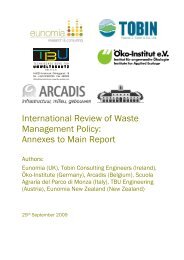Report of the Local Government Efficiency Review Group
Report of the Local Government Efficiency Review Group
Report of the Local Government Efficiency Review Group
Create successful ePaper yourself
Turn your PDF publications into a flip-book with our unique Google optimized e-Paper software.
legislation provides that arrears <strong>of</strong> water charges can be made a charge<br />
against <strong>the</strong> property where <strong>the</strong> recipient <strong>of</strong> <strong>the</strong> water service is <strong>the</strong> owner <strong>of</strong><br />
<strong>the</strong> property. However, <strong>the</strong> <strong>Group</strong> recognises that, as <strong>the</strong> majority <strong>of</strong><br />
commercial water customers are tenants or leaseholders, alternative<br />
approaches are required for <strong>the</strong> late payment <strong>of</strong> charges by commercial<br />
enterprises where <strong>the</strong> property concerned is a rented property. For this<br />
reason, <strong>the</strong> incrementally increasing non/late payment penalty approaches<br />
<strong>of</strong> <strong>the</strong> NPPR should be considered.<br />
13.3.8 It is not possible at this stage to put a specific figure on <strong>the</strong> possible income<br />
that would accrue to local authorities. However, given <strong>the</strong> considerable<br />
arrears outstanding, if successful, such changes could lead to significant<br />
savings for local authorities in terms <strong>of</strong> both arrears collected, and <strong>the</strong> costs<br />
associated with revenue collection. The more that can be collected<br />
automatically, or at source, <strong>the</strong> greater <strong>the</strong> certainty <strong>of</strong> revenue collection<br />
and <strong>the</strong> lower <strong>the</strong> administrative cost.<br />
13.4 <strong>Local</strong> Taxes and Charging<br />
13.4.1 The 2009 renewed Programme for <strong>Government</strong> and <strong>the</strong> 2009 Commission<br />
on Taxation report proposed both <strong>the</strong> introduction <strong>of</strong> an annual local tax on<br />
residential land and <strong>the</strong> reintroduction <strong>of</strong> domestic water charges (see<br />
section 4.3). The Commission on Taxation estimated that <strong>the</strong>ir proposal for<br />
an annual tax on residential property would raise in <strong>the</strong> region <strong>of</strong> €1 billion<br />
per year, although <strong>the</strong> exact figure would depend on <strong>the</strong> rate set. The<br />
Commission fur<strong>the</strong>r suggested that <strong>the</strong> levying <strong>of</strong> domestic water charges<br />
could raise a fur<strong>the</strong>r €450 million, although this did not take account <strong>of</strong> a<br />
potential decision to allow domestic users to use a certain volume <strong>of</strong> water<br />
free <strong>of</strong> charge.<br />
13.4.2 In December, <strong>the</strong> <strong>Government</strong> gave approval in principle for <strong>the</strong> Minister for<br />
<strong>the</strong> Environment, Heritage and <strong>Local</strong> <strong>Government</strong> to commence <strong>the</strong><br />
preparation <strong>of</strong> legislation to remove <strong>the</strong> prohibition on charging domestic<br />
users for water services and to provide a legal framework for local<br />
authorities to charge for <strong>the</strong> provision <strong>of</strong> water services. It is intended that<br />
water charges will be based on volumetric usage, and will involve <strong>the</strong><br />
installation <strong>of</strong> water meters in households connected to a public water<br />
supply.<br />
13.4.3 It should also be noted that <strong>the</strong>re could be a significant lead-in time before<br />
both proposals can be implemented, particularly if <strong>the</strong> models <strong>of</strong> taxation<br />
and charging adopted depend on property valuations and water metering.<br />
Installing domestic water meters will also involve a significant upfront<br />
investment. Proposals are currently being finalised on <strong>the</strong> delivery <strong>of</strong> a<br />
water metering programme. Given <strong>the</strong> scale <strong>of</strong> <strong>the</strong> metering programme, it<br />
is envisaged that it would take approximately five years to install water<br />
meters in all households in receipt <strong>of</strong> public supplies. The cost <strong>of</strong> <strong>the</strong><br />
metering campaign is estimated to be in <strong>the</strong> region <strong>of</strong> €500 million based on<br />
<strong>the</strong> recommended approach. The estimate does not include o<strong>the</strong>r costs<br />
167
















